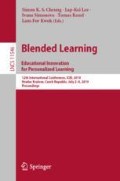Abstract
In order to study the students’ acceptance of educational games in the stage of compulsory education, and to understand the relevant factors that affect their acceptance, the study used self-educated educational games technology acceptance questionnaires as the main tool and surveyed 16,757 students in the compulsory education period from the first to the ninth grade. The results show that students generally have a higher acceptance of the educational games. This acceptance is affected by many factors, including grade level, family location, parental education, time of parents’ accompanying, academic level, and related technical experience all have impact on students’ technical acceptance. However, regression analysis found that students’ acceptance is not enough to predict whether they would actually use educational games, for parents and teachers may play a greater role in it. However, the technical acceptance of students can still be used to predict the effectiveness of use of educational games. In order to understand the rules and mechanism of educational games, researchers should consider the situation of students, parents and teachers comprehensively.
Access this chapter
Tax calculation will be finalised at checkout
Purchases are for personal use only
References
Al-Adwan, A., Al-Adwan, A., Smedley, J.: Exploring students acceptance of e-learning using technology acceptance model in jordanian universities. Int. J. Educ. Dev. Using Inf. Commun. Technol. 9(2), 4–18 (2013)
Bourgonjon, J., Valcke, M., Soetaert, R., Schellens, T.: Students’ perceptions about the use of video games in the classroom. Comput. Educ. 54(4), 1145–1156 (2010)
Çankaya, S., Karamete, A.: The effects of educational computer games on students’ attitudes towards mathematics course and educational computer games. Pro.-Soc. Behav. Sci. 1(1), 145–149 (2009)
Cheung, C.M., Lee, M.K.: Exploring the gender differences in student acceptence of an internet-based learning medium. In: Technology acceptance in education, pp. 183–199. Sense Publishers (2011)
Davis, F.D.: Perceived usefulness, perceived ease of use, and user acceptance of information technology. MIS Q. 13, 319–340 (1989)
Franceschini, S., Gori, S., Ruffino, M., Viola, S., Molteni, M., Facoetti, A.: Action video games make dyslexic children read better. Curr. Biol. 23(6), 462–466 (2013)
Lamb, R.L., Annetta, L., Firestone, J.: A meta-analysis with examination of moderators of student cognition, affect, and learning outcomes while using serious educational games, serious games, and simulations. Comput. Hum. Behav. 80, 158–167 (2018)
Legris, P., Ingham, J., Collerette, P.: Why do people use information technology?: a critical review of the technology acceptance model. Inf. Manag. 40(3), 191–204 (2003)
Malaquias, R.F., Malaquias, F.F., Hwang, Y.: Understanding technology acceptance features in learning through a serious game. Comput. Hum. Behav. 87(5), 395–402 (2018)
Marino, M.T., Israel, M., Beecher, C.C., Basham, J.D.: Students’ and teachers’ perceptions of using video games to enhance science instruction. J. Sci. Educ. Technol. 22(5), 667–680 (2013)
Martins, L.L., Kellermanns, F.W.: A model of business school students’ acceptance of a web-based course management system. Acad. Manag. Learn. Educ. 3(1), 7–26 (2004)
Park, S.Y.: An analysis of the technology acceptance model in understanding university students’ behavioral intention to use e-learning. Educ. Technol. Soc. 12(3), 150–162 (2009)
Shang, J.J., Xiao, H.M., Jia, N.: The overview of the empirical research from worldwide: 2008-2012. Res. Educ. Technol. 1, 71–78 (2014)
Author information
Authors and Affiliations
Corresponding author
Editor information
Editors and Affiliations
Rights and permissions
Copyright information
© 2019 Springer Nature Switzerland AG
About this paper
Cite this paper
Jiang, Y., Zhao, Y., He, Y., Jiao, L., Qu, X. (2019). A Study on Acceptance of Educational Games for the Students in the Stage of Compulsory Education. In: Cheung, S., Lee, LK., Simonova, I., Kozel, T., Kwok, LF. (eds) Blended Learning: Educational Innovation for Personalized Learning. ICBL 2019. Lecture Notes in Computer Science(), vol 11546. Springer, Cham. https://doi.org/10.1007/978-3-030-21562-0_26
Download citation
DOI: https://doi.org/10.1007/978-3-030-21562-0_26
Published:
Publisher Name: Springer, Cham
Print ISBN: 978-3-030-21561-3
Online ISBN: 978-3-030-21562-0
eBook Packages: Computer ScienceComputer Science (R0)

